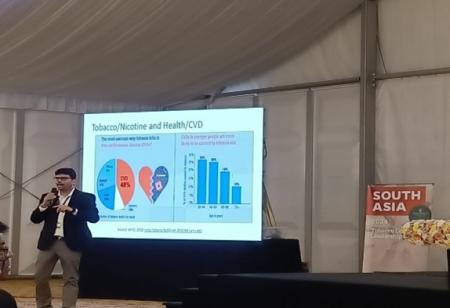
Weight Gain After Smoking Cessation Hikes Diabetes Risk — But Not to Worry - 15 August 2018

— Diabetes risk eventually returns to normal, and outweighed by overall survival boost
by Salynn Boyles, Contributing Writer, medpagetoday.com
Although weight gain associated with smoking cessation is a genuine risk factor for developing diabetes, the increase is temporary and the benefits of quitting far outweigh the metabolic risks, researchers said.
Diabetes risk peaked 5 to 7 years after quitting smoking and then gradually decreased in a cohort study appearing in New England Journal of Medicine.
“We have known that diabetes risk increases in smokers who gain weight when they stop smoking, but previous studies were not able to fully explore this,” said Qi Sun, MD, of the Harvard T.H. Chan School of Public Health, Boston.
Sun told MedPage Today that while it stands to reason that weight gain linked to smoking cessation is the culprit, this had not been shown in previous studies. It has also not been clear to what extent weight gain after smoking cessation attenuates the health benefits of quitting smoking.
In their newly published study, Sun and colleagues examined an average of nearly 19 years of data from 171,150 men and women enrolled in three large U.S. cohort studies — the Nurses’ Health Study, the Nurses’ Health Study II, and the Health Professionals Follow-Up Study.
Smoking cessation-related diabetes risk was found to be linearly associated with the amount of weight quitters gained, with those who gained no weight showing no risk increase.
And even among those who gained the most weight — about 22 pounds — the risk of early death due to all causes or cardiovascular disease decreased by an average of 50% and 67%, respectively, after quitting smoking.
“Smokers should quit because the long-term benefits are clear,” Sun said.
In the three cohort studies, the researchers identified people who had reported quitting smoking and they prospectively assessed changes in smoking status and body weight. They also estimated type 2 diabetes risk, death from cardiovascular disease and death from any cause among those who reported quitting smoking, according to weight changes after smoking cessation.
During a mean of 19.6 years of follow-up, 12,384 cases of type 2 diabetes were confirmed. Among 836 recent quitters who developed type 2 diabetes, 204 experienced no weight gain, 206 gained up to 11 pounds, 206 gained 11 to 22 pounds and 196 gained more than 22 pounds.
The risk of type 2 diabetes was found to be higher among recent quitters (2 to 6 years since smoking cessation) than among current smokers (HR 1.22; 95% CI 1.12-1.32) and risk peaked 5 to 7 years after quitting and then gradually decreased.
The temporary increase in type 2 diabetes risk was directly proportional to weight gain, and the risk was not increased among quitters without weight gain (P6 years)
Similar associations were seen for death from any cause.
“Overall, our data showed that subsequent weight gain, on average, did not attenuate the apparent benefits of smoking cessation on reducing cardiovascular mortality or extending longevity. However, preventing excessive weight gain may maximize the health benefits of smoking cessation through reducing the short-term risk of diabetes and further lowering the long-term risk of death.”
“The finding that the elevated risk only lasts for 5 to 7 years should be seen as reassuring,” Sun said. “There are a lot of health benefits associated with stopping smoking, and the diabetes risk is modifiable by keeping weight gain to a minimum.”





